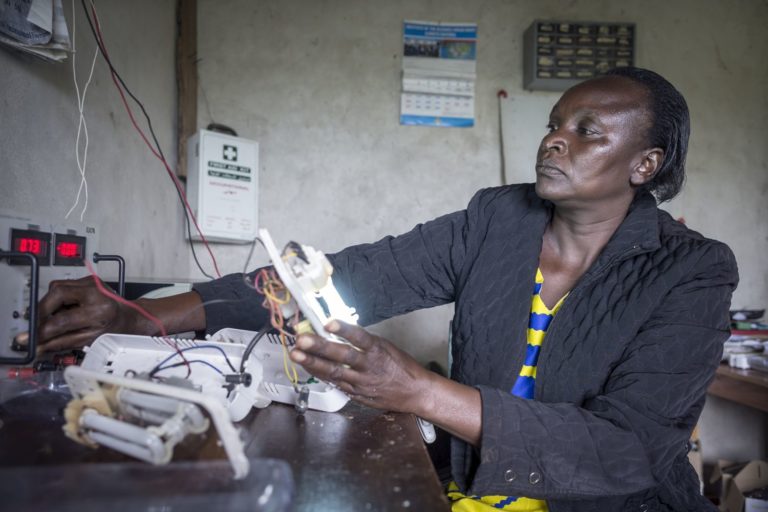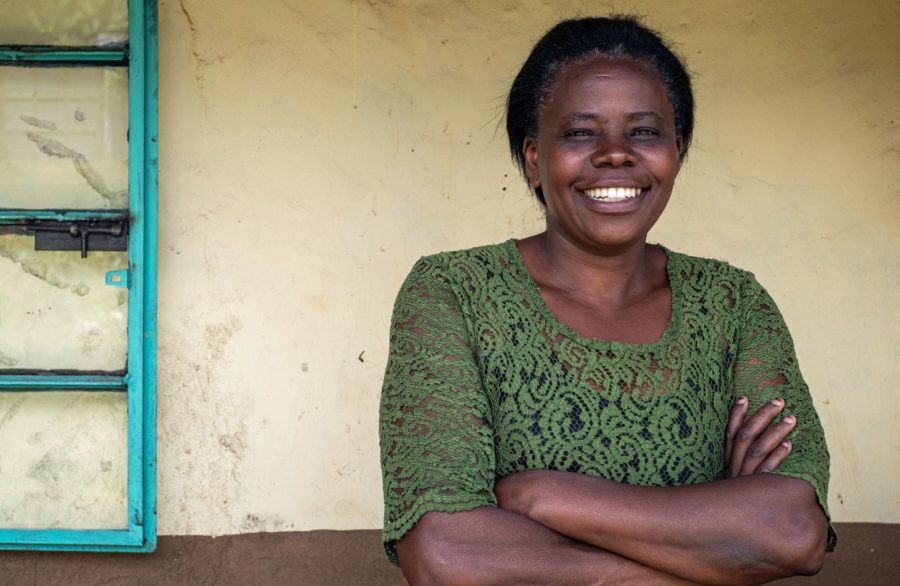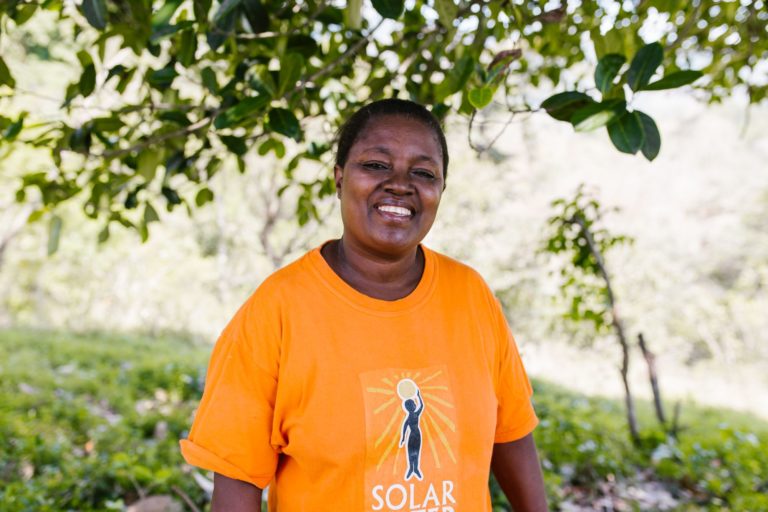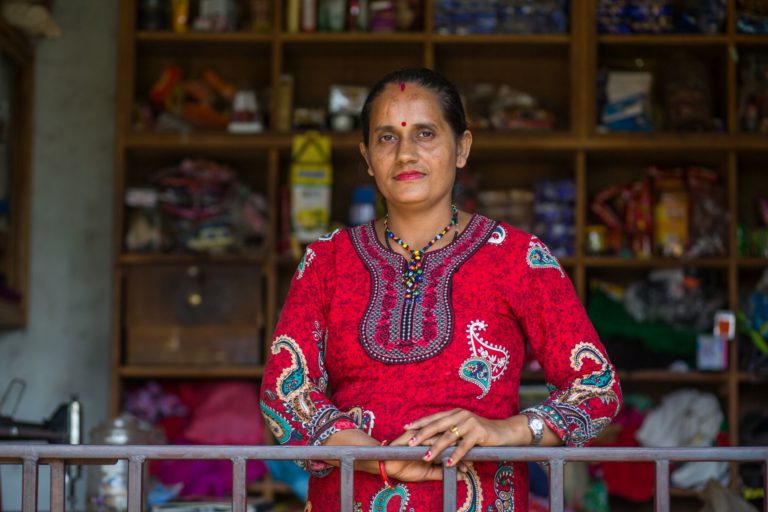
- Date
- 13th December 2021
- Categories
- General
A partnership among various donors supports eleven organizations in Kenya, Tanzania and Nepal to pilot their innovative idea. These pilots will all address persistent gender challenges in energy access, use, provision and transition.
Worldwide, 760 million people still lack access to electricity. Another 2.6 billion (ESMAP, Tracking SDG 7. The energy progress report 2021) still rely on polluting cooking fuels, jeopardizing their health. These figures are likely to have deteriorated further due to the COVID-19 pandemic. This lack of access to clean and affordable energy primarily affects women in poor and rural areas, who are more often than not household managers, primary caregivers and cooks. At the same time, women are in the unique position to scale energy solutions to last-mile and underserved areas because of their vast networks, and many of them already are business owners. Women should have a seat at the table in decision-making groups as their needs as energy users are different from men’s.
To bridge the gender gaps throughout the energy supply chain and in decision-making groups, ENERGIA, EnDev, Modern Energy Cooking Services (MECS), Hivos and the Swedish International Development Cooperation Agency (SIDA), launched the Gender and Energy Innovation Facility in July 2020. The facility aims at developing, testing and evaluating innovative approaches to address the persistent gender energy challenges.
“The continuing persistence of barriers for girls and women in the energy sector calls for innovative proposals to strengthen girls’ and women’s access to energy, boost women participation in STEM studies, foster women entrepreneurship, and scale-up access to safe and clean cooking fuels,” says Innovation Facility Manager Silvia Sartori. “As the COVID-19 pandemic has aggravated the progress towards SDG 5 and SDG 7 and brought the urgency of overcoming these barriers to our attention, we need more innovative approaches than ever before to identify and tap into the potential of resources so far unexplored. We are highly interested in the findings of these pilot initiatives.”
The facility supports innovations that contribute to bridging the gap in three thematic areas:
- Gender and energy entrepreneurship and employment
Women should get equal opportunities to participate in and support the clean energy sector as entrepreneurs and employees. This includes getting equal access to funding and investment for their businesses. - Gender and energy in the care economy
Women are the principal family caregivers. Better energy access and suitable appliances can significantly save time and labour, essential health, sanitation and safety, and close the digital divide between men and women. Access to clean cooking is especially critical for health, the environment, and gender equality. - Gender in energy policy and practice
Women need to have a seat at the table when strategies and policies about energy transitions and economic recovery are planned and decided.
Learn more about these innovative projects below!
KENYA

Last-mile products delivery
The Kenya Women Microfinance Bank PLC (KWFT) is testing an innovative method of offering energy products in kind by partnering with energy products suppliers and manufacturers. This concept forms an intermediate function between the supplier, the bank and the customers, all women. When the customer applies for a loan, KWFT orders the product from the supplier, who delivers the product at the KWFT branch closest to the customer. However, this can still be as far as 50 km away from the customer’s house. In this innovative model of last-mile product delivery, KWFT engages with customers, their children (over 18 years) and spouses, to become delivery champions of the energy products using their transportation means, often rented motorbikes. In many cases, customers rent transportation means from enterprises owned by women. For the model to be sustainable, the clients are requested to pay a moderate fee. Thus, rather than getting a loan and buying the energy device themselves, the women get the device they need delivered at their doorstep!
A new type of cooking fuel spares the environment and saves money
In Homa Bay, Western Kenya, Nyalore Impact Limited is developing a new type of fuel block, based on combustible trash. With no waste management system in place in Homa Bay, waste is currently either burnt or thrown away in the drainage system. This poses a threat to the environment and public health. The new fuel blocks will significantly reduce the amount of trash. For its production, Nyalore Impact Limited collaborates with local marginalized women such as widows, women with HIV and disabled women. In exchange for picking up garbage waste, they receive solid blocks as cooking fuel for free. This shows a second positive effect: the collaborating women will be saving money they would otherwise have spent on cooking fuel. Furthermore, because of the business model – engagement with different stakeholders – we expect the cost of these solid cooking fuel blocks to be much lower than the char dust ones people use now. The blocks also generate less smoke than charcoal and char dust blocks, positively impacting public health.
Delivering healthy meals using clean cooking technologies
Sustainable Community Development Services (SCODE) will pioneer with a Modern Energy Cooking Hub (MECH) run by women and youth in Nakuru, the third-largest city in Kenya. The hub pilots the use of the grid (backed up by solar power) and clean cooking technologies such as pressure cookers and electric stoves to prepare delivery meals. Women and youth also run the home-delivery service. Thus, the hub intends to provide affordable, healthy meals delivered at home while creating jobs and using clean cooking technologies. Furthermore, customers will be able to use the time saved to invest in income-generating activities.
Pico-solar systems produced by women
The Gender and Energy Innovation Facility provided Wilson Okwako Ombisi, a technical expert with vast experience in renewable energy technologies and their application, with the perfect opportunity to present and test a newly designed pico-solar lighting system that addresses three issues:
- Lack of women engineers in the sustainable energy industry
- Growing amounts of e-waste
- High replacement costs when expanding a home solar system.
The project trains women with qualifications in electricals and electronics to become engineers. After the training course, they will control the first home-based pico-solar manufacturing and distribution line in Kenya. The trained women will become producers, distributors, installation technicians, and owners of service clinics of a new type of solar system. These new pico-solar systems are designed so that expansion from 2 or 3 lamps to 5 or more is possible. Now, expanding means one has to buy an entirely new system. As customers don’t have to replace an entire system, they save money to cover other needs.
TANZANIA

Using digital technology to break gender stereotypes
Nukta Africa Ltd. is a digital media startup specializing in training courses and research and development of digital and data-driven news and tools. It also addresses gender stereotypes in the cooking realm. Jiko Class provides online cooking classes for boys. Jiko News offers an online platform to publish content on cooking techniques and devices anonymously. This encourages men to contribute and share experiences as women are used to doing. Content is about reducing the consumption of firewood, charcoal and kitchen running costs of LPG and electricity. The platform suggests energy-saving recipes, utensils and electric devices. Jiko Sokoni helps women and other entrepreneurs who produce clean energy appliances to sell their products and link users with providers. Nukta Africa’s dream for Tanzania 20 years from now is families living happily with clean energy. “Where the boys have used Jiko Class to learn amazing cooking skills, mothers are entrepreneurs of clean cooking appliances, and fathers are using the app to buy gas and other clean cooking appliances,” says Maphosa Banduka, project manager.
Involving young women in the production of solar products
Another project that addresses the gender stereotypes in the energy sector boosts the employability of young women in solar energy technology. The Tanzania Renewable Energy Association (TAREA) is training young women on solar photovoltaic technology, enabling them to assemble and repair solar lamps. In the future, these women will earn a living by assembling solar lamps or doing maintenance and troubleshooting in community-owned installations. This will lead to trainees running community solar installations and retail shops and becoming community leaders, breaking gender stereotypes and providing these young women with an income.
A new, politician-centred approach to advocate for clean cooking
While communities usually pressure politicians to bring about changes or decisions at the local government level, the Tanzania Gender and Sustainable Energy Network (TANGSEN) project actively involves politicians to bring about these changes. In the case of clean cooking, testing this reversed approach is worthwhile because upscaling clean cooking is not going fast enough. The country’s target is to achieve access to clean cooking for more than 75% of the households by 2030. But, currently, about 89% of the households are still using charcoal and firewood for cooking. In this innovative advocacy approach, TANGSEN identifies and selects six champions among district councils. These champions will receive information, training courses and clean cooking technologies to use themselves, to draw on their own experience. They will root for broad adoption of clean cooking fuels and technologies amongst their peers, leading to development plans with true commitments in terms of budgets, targets and actions. And because of their more personal involvement, they will hold officials accountable for implementing and achieving the commitments, thus advancing the clean cooking agenda in Tanzania.
Briquettes made from coconut shell
While char-briquettes made from coconut waste are not new on the market, they will be in Tanzania. With the Mkaa Nazi Tanzania project, three young entrepreneurs start a char-briquette production plant to sell the briquettes, involving four groups of women:
- market vendors who sell coconuts for raw material collection,
- food vendors who need large amounts of cooking energy daily,
- women entrepreneurs as salesforce, and
- households who also need cooking energy every day, as private customers.
The project hopes to induce a behavioural change among the four groups, demonstrating the benefit of coconut waste briquettes: long-lasting, hotter, smokeless, and cheaper than the commonly used charcoal.
NEPAL

Women trained to repair electrical cooking devices
The Nepalese government has clean energy, clean cooking and gender inclusion high on its agenda. Hence, promotion and increasing the use of e-cooking has been a prime focus in the Nepalese energy market. And while users are switching to e-cooking, there appears to be a gap in after-sales services. The Women’s Network for Energy and Environment (WoNEE) wants to close this gap. WoNEE wants to train women who own an electrical appliances store to provide maintenance and repair services, mainly for electric stoves. Customers now have somewhere to go when their appliances need maintenance. This will promote electric cooking. It also provides shop owners with an additional income.
Since 75% of the workforce in the paper industry is women, they are the most affected by toxic smoke. Photo: Nabin Baral/ENERGIA
Improving the production process of typical Nepalese handmade paper
Lokta paper is a typical and traditional handmade paper from Nepal. After having been around for over 1,000 years, the typical paper almost disappeared. Since the rise of Nepal’s tourism industry in the 1970s, the demand for Lokta paper also began to rise again. Currently, the Lokta paper industry grows at a rate of 15% per year. The production process, however, is highly polluting and energy-consuming. Since 75% of the workforce in this industry is women, they are the most affected by the harsh working environment as they inhale the toxic smoke. The innovations that PACE Nepal Pvt. Ltd. brings to this industry are important changes in the production process, making it more environmentally friendly and improving the working conditions. Replacing the traditional open type drum cooking vessel with a pressurized cooking one will reduce the cooking time and save energy. Replacing traditional inefficient cooking stoves with an improved clean one also saves energy and produces less toxic smoke. A third way to reduce the fuel is using a solar water heater for preheating the water in the cooking vessel.
Mobile solar farm combined with vermiculture grows women’s economic empowerment
In rural Nepal, domestic chores, including the care for the elderly, children and the sick, often fall on women and girls. This confines them to home-based economic activities. A vital step toward gender equality would be ‘backyard income generation’. This way, caring for family members does not impede women’s earning potential. The Gham Chhaya Farms project stimulates this backyard income generation by stimulating women farmers to operate and use solar energy for productive purposes while combining this with vermiculture boxes underneath the solar panels. The vermiculture boxes produce compost that farmers can use on their farms. The project will select a community engaged in activities such as agriculture (vegetable farming), dairy or poultry. Farmers can use the energy from the solar panels for chilling milk and other dairy products or the lamps used on chicken farms to regulate the temperature. The compost serves as fertiliser. Any excess from the system – energy, compost or worms – can be sold or traded as an additional source of income.
“The Gender and Energy Innovation Facility has taken a comprehensive and science-based approach to innovation in both choosing pilots and supporting them, and it shows!” says Tamara Puhovski, Impact House director and mentor and innovation specialist of the Facility. “The chosen projects are truly innovative in various fields from innovating products, processes to testing existing solution in new contexts to changing paradigms. All are contributing to not just moving forward in a faster and more inclusive way, but leading in a sustainably powered, equality women-powered world.”
After the first year, a selected number among the most promising pilots will receive additional support to scale up their initiative.
………………………………………………………………………………………………………………………………………
Featured image: Phoebe Awuor Jondiko maintains and repairs solar lamps distributed to about 100 households in western Kenya. Photo: Sven Torfinn/ENERGIA